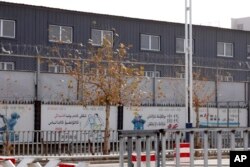China is permitting more than 2,000 ethnic Kazakhs to surrender their Chinese citizenship and leave the country, the Kazakh Foreign Ministry said this week.
The move may be a sign that China is feeling international pressure about its widespread detention of Muslims in the country’s far western Xinjiang area.
The detention of ethnic Uyghur, Kazakh and other minorities in internment camps has caused tension between China and neighboring Kazakhstan. China is a major trading partner, and Kazakhstan’s state-restricted media had mostly avoided reporting on the issue.
But activists say pressure for action has slowly increased, following an Associated Press story on the camps in May and other international media reports.
The Kazakh Foreign Ministry has confirmed that China has agreed to let over 2,000 ethnic Kazakhs leave. It did not say who could leave or why they were able to leave. Those people will now be able to request Kazakh citizenship or permanent residency, Kazakh officials told the AP.
The Chinese Foreign Ministry did not answer an AP request for comment.
In recent years, Chinese officials have carried out a severe policing and detention campaign in the large, resource-rich Xinjiang region. Rights groups and experts have estimated that possibly 1 million people are being held in what China has called “re-education” camps.
Former detainees have said they were forced to reject their culture and religion and subjected to political teachings.
News of the detentions has sent fear throughout the small, close community of Chinese-born Kazakhs now living in Kazakhstan. Many left China in the last few years for work or to educate their children in Kazakh schools, as restrictions in Xinjiang increased.
Hundreds lost contact with family members still there. Many began writing letters and attending press conferences. They hoped that greater publicity would help them find their relatives.
Serikzhan Bilash is head of the advocacy group Atajurt. He said he senses a small change in the Kazakh government’s position. He says that last year officials warned him many times to end his activism activities. Now, he says, the warnings have stopped. He was even recently invited onto a popular Kazakh talk show. He says he felt the move was a sign of growing approval of his efforts to publicize the difficulties of detained Kazakhs.
“I said that Chinese officials are dangerous for Central Asia, for Kazakhstan,” Bilash said. “They’re starting to accept my opinion now.”
While they have avoided criticizing China, Kazakh diplomats have worked to secure the release of their own citizens in Xinjiang. Foreign Ministry officials said in November that China had detained 29 Kazakh citizens, and 15 had since been released and permitted to enter Kazakhstan.
Gene Bunin is an activist who has collected stories from about 2,000 relatives of detainees in Xinjiang. He estimates that about 20 people, possibly more, were permitted to return to Kazakhstan last year. Bunin has noted another 70 or so who have been released from camps but kept in their home villages in Xinjiang and not permitted to leave China.
“They’ve been getting released since September,” said Bunin, who lived in Xinjiang until last year. “I suspect it’s sort of an appeasement thing going on, where they’re trying to satisfy the relatives, to defuse tensions.”
Those permitted to return so far have been largely Kazakh citizens or those with Kazakh partners or children.
One 23-year-old Kazakh citizen, who asked to be identified only by Guli was able to return from Xinjiang in July. She had been separated from her husband and two children for more than two years. She said she cried after a Kazakh official called to say she might be able to return.
Guli said, “I thought I’d never be able to go back to Kazakhstan again, that I wouldn’t able to see my kids again. I had lost all hope.”
I’m Ashley Thompson.
I'm Caty Weaver.
The Associated Press reported this story. Ashley Thompson adapted it for VOA Learning English. Caty Weaver was the editor.
______________________________________________________________
Words in This Story
internment - n. the act of putting someone in a prison for political reasons or during a war
residency - n. the state or fact of living in a place
region - n. a part of a country, of the world, etc., that is different or separate from other parts in some way
advocacy - n. the act or process of supporting a cause or proposal
appeasement - n. the act of making someone who is pleased or less angry by giving or saying something desired
defuse - v. to make (something) less serious, difficult, or tense







